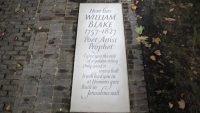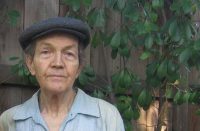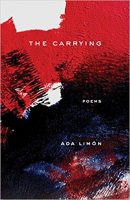August 24, 2018
Edited by David Sanders
Specimen Days
1591—Luis de Leon, Spanish scholar and poet, dies at 64.
1593—Fulvio Testi, Italian poet (Pianto d'Italia), born in Ferrara, Italy (d. 1646), is born.
1849—William Ernest Henley, British poet, critic, and editor, born in Gloucester, England (d. 1903), is born.
1869—Edgar Lee Masters, American poet and novelist (Spoon River Anthology), born in Garnett, Kansas.
1929—Charles Van de Woestijne, Flemish writer/poet (God on Sea), dies.

I have known the silence of the stars and of the sea,
And the silence of the city when it pauses,
And the silence of a man and a maid,
And the silence of the sick
When their eyes roam about the room.
And I ask: For the depths,
Of what use is language?
A beast of the field moans a few times
When death takes its young.
And we are voiceless in the presence of realities —
We cannot speak.
—from “Silence” by Edgar Lee Masters
I have known the silence of the stars and of the sea, / And the silence of the city when it pauses,” – Edgar Lee Masters
World Poetry
At Country-wide Cultural Festival, Young Afghans Promote Peace and Poetry in Herat
Ahead of International Youth Day, the UN and partners organized an Afghanistan-wide poetry competition, drawing hundreds of writers and poetry aficionados from across the country to the western province of Herat for a celebration of Afghan literature. The event, which took place in the Herat Citadel and was set up to help young people from across the country apply their talents to the tradition of Afghan poetry, drew an audience of several hundred literature enthusiasts and featured poetry recitals and musical performances.
Crowd-funded Headstone Marks Lost Grave of Poet William Blake

The lost resting place of British poet and artist William Blake was finally marked Sunday with a gravestone, almost 200 years after he died. Despite his influence today, Blake died in obscurity in 1827 and was buried in an unmarked common grave in Bunhill Fields, a London cemetery. Only a plain memorial stone recorded that he was buried nearby, much to the dismay of two devotees who visited, and who decided to find his exact resting place. Luis and Carol Garrido had as their guide the original coordinates of his burial, which were based on a grid of graves but became confused when parts of the cemetery were converted into gardens.
The lost resting place of William Blake was finally marked Sunday with a gravestone, almost 200 years after he died.
Recent Reviews
Feel Free by Nick Laird review – glimpses of elsewhere
Nick Laird’s acute eye and shades of meaning make these poems a gift to read
by Kate Kellaway
Feel Free is an ambiguous title. You could be taking an empty chair with Laird’s permission and helping yourself to his poems, or it might be an imperative on how to live your life. (The title proved so tempting that Zadie Smith, Laird’s wife, poached it for her recently published essay collection; they now find themselves in the engagingly absurd situation of having published two books under the same name, a form of literary marriage, you could say.)
Henri Cole's Orphic Paris reviewed
by Ian Pople
For Henri Cole, ‘…Paris is the city of the beloved’. This not only implies that the beloved lives in Paris but also that the city holds the beloved, that the existence of the beloved is part and parcel of the existence of Paris. If Henri Cole’s Orphic Paris is clearly a love letter to Paris, it is also a description of what that might mean; of how a life might actually absorb and possess a particular place. As such, seventeen sections move between some of the people Cole met in Paris, and the things he saw, to reflections on his family life. In particular, Cole gives loving and poignant descriptions of his mother, who was a first-generation Frenchwoman, and spoke French and Armenian, and met Cole’s father, an American father at a military base. Cole writes with heart-breaking tenderness about the end of his mother’s life, and her reversion to her native French.
Poetry: David Mason; Jordie Albiston; Jill Jones; Jennifer Harrison
by Geoff Page
David Mason, a well-known American poet and essayist, previously based in Colorado, is in the process of moving to Tasmania. The Sound: New & Selected Poems (Red Hen Press, 242pp, $40) is an ideal opportunity to sample his work and perhaps speculate on what he might write in his new environment. The first thing to note is that Mason is a very American poet, with a strong sense of that country’s landscapes and peoples.
‘The Penguin Book of Haiku’: Morsels of poetry from the mountaintop to the gutter
by Kris Kosaka
‘The Penguin Book of Haiku” will challenge your view of the revered poetic form, and that’s exactly the aim of editor and translator, Adam L. Kern. A Harvard-trained professor of Japanese literature and visual culture at the University of Wisconsin-Madison, Kern wants to debunk the modern “grand narrative” of haiku. As Kern tells The Japan Times: “There’s this pervasive myth that haiku is only nature poetry, that it is always serious and connected to Zen, that there are hardly any women haiku poets. Yet there’s a discrepancy between this myth and the haiku one actually encounters. Haiku covers far greater ground.”
For Henri Cole, ‘…Paris is the city of the beloved’
Broadsides
Searching for a Lost Odessa — and a Deaf Childhood
by Ilya Kaminsky
What I remember most of all is washing Leo Tolstoy’s ears. The year is 1989, the mornings of revolution, the year when my birth country begins to fall apart. His ears are larger than my head; I am standing on the shoulders of a boy who is standing on the shoulders of another boy. I am scrubbing the enormous bearded head on a pedestal — in the center of Leo Tolstoy Square, one block from our first apartment. This is childhood: Once a year, my classmates and I are sent to the center of the square. Our assignment is to wash the head of a dead writer. We climb on top of one another’s bodies and scrub Tolstoy’s nostrils, ears. In the distance, my parents laugh, watching. Their deaf boy climbs and scrubs the enormous ears.
Ezra Pound Wrote the World’s Single Greatest Poem, but is it Wrong to Love a Fascist?
by Ash Sarkar
Nothing in this life is certain aside from death, taxes and English literature graduates writing in the Guardian and spoiling your enjoyment of things you had previously thought were fine. While the meme of the problematic fave may be five years old, the enduring agony and ecstasy of having one tells us a lot about the way popular culture shapes our entire sense of self. The problematic fave has its origins in that crucible of millennial woke culture, Tumblr. A modern-day Domesday Book called Your Fave Is Problematic catalogued examples of transphobic, misogynist and white-supremacist behaviour from supposedly liberal heroes (RuPaul using the slur “tranny”, for example). As such, the problematic fave should not be confused with its insipid country cousin, the guilty pleasure.
How Poetry Came to Matter Again
A young generation of artists is winning prizes, acclaim, and legions of readers while exploring identity in new ways.
by Jesse Lichtenstein
The poetry world would hardly seem a likely place for a “race row,” the phrase The Guardian applied in 2011 to a blunt exchange of literary verdicts. The celebrated (and white) critic Helen Vendler had disparaged the celebrated (and black) poet Rita Dove’s selections for the new Penguin Anthology of Twentieth-Century American Poetry. Dove, Vendler wrote, had favored “multicultural inclusiveness” over quality. She’d tried to “shift the balance” by choosing too many minority poets at the expense of better (and better-known) writers. The poems were “mostly short” and “of rather restricted vocabulary,” the presiding keeper of the 20th-century canon judged. Over at the Boston Review, the (also white) critic Marjorie Perloff, the doyenne of American avant-garde poetics, weighed in too. She lamented what she saw as new poets’ reliance on a formulaic kind of lyric already stale by the 1960s and ’70s—a personal memory dressed up with “poeticity,” building to “a profound thought or small epiphany.” Her example: a poem by the acclaimed (also black) poet Natasha Trethewey about her mother’s painful hair-straightening routine.
A young generation of poets is winning prizes, acclaim, and legions of readers while exploring identity in new ways.
Drafts & Fragments
Microsoft’s AI Can Convert Images into Chinese Poetry
by Tristan Greene
Microsoft recently taught its XiaoIce chatbot, a Chinese language conversational AI, how to interpret pictures as poems. We’re not sure if that counts as inspired writing, but it’s an interesting step toward better mimicking humans. It’s not the first AI to write poetry, but it’s the first we’ve seen that can generate Chinese language poems inspired by images. There may be a little bit lost in translation, but some of the bot’s bars aren’t too shabby.
Microsoft recently taught its XiaoIce chatbot, a Chinese language conversational AI, how to interpret pictures as poems.
Poetry In the News
Anya Krugovoy Silver, Poetic Voice on Mortality, Dies at 49

Anya Krugovoy Silver, the poet who, after receiving a diagnosis of advanced breast cancer in 2004, wrote lyrical verse that gave readers an exquisite, intimate and sometimes angry account of her illness, died on Monday in Macon, Ga. She was 49. Andrew Silver, her husband, confirmed the death. Ms. Silver was pregnant and teaching English literature at Mercer University in Macon when she learned that she had inflammatory breast cancer, a particularly rare and aggressive kind. She gave birth to her only child, Noah; had a mastectomy; and discovered the intensity with which cancer inspired her poetry.
Langston Hughes Just Got a Year Older
Few poets can claim a final resting place as, well, poetic as Langston Hughes. His ashes are buried under the floor of the lobby of the New York Public Library’s Schomburg Center for Research in Black Culture, beneath a mosaic cosmogram that includes lines from his classic poem “The Negro Speaks of Rivers.” Hughes, a leading light of the Harlem Renaissance whose work aimed to capture the whole of the African-American experience, was only 18 when he wrote that poem. Or was he?
Tom Clark, Renowned Poet and Biographer, Dies in Berkeley Crash

The Berkeley man who died after being struck by a car while crossing The Alameda at 8:40 p.m. on Friday has been identified by friends as the poet Tom Clark. Clark was a poet, editor, sportswriter and biographer, according to his Wikipedia entry which had been updated with his death, including a link to Berkeleyside’s afternoon story, on Saturday. He was born in Chicago and attended the University of Michigan. He married Angelica Heinegg in 1968 in New York. Clark wrote dozens of books of poetry. His recent books include Light & Shade: New and Selected Poems (Coffee House, 2006) and Threnody (effing press, 2006).
Anya Krugovoy Silver, a poet who wrote verse that gave readers an intimate account of her illness, died on Monday.
New Books
My Bishop and Other Poems by Michael Collier
[Paperback] University of Chicago Press, 80 pp., $18.00
Whether Michael Collier is writing about an airline disaster, Huey Newton’s trial, Thomas Jefferson’s bees, a piano in the woods, or his own fraught friendship with the disgraced Catholic Bishop, his syntactic verve, scrupulously observed detail, and flawless ear bring the felt—and sometimes frightening—dimensions of the mundane to life. Throughout, this collection pursues a quiet but ferocious need to get to the bottom of things.
Be With by Forrest Gander
[Paperback] New Directions, 80 pp., $16.95
Drawing from his experience as a translator, Forrest Gander includes in the first, powerfully elegiac section a version of a poem by the Spanish mystical poet St. John of the Cross. He continues with a long multilingual poem examining the syncretic geological and cultural history of the U.S. border with Mexico. The poems of the third section―a moving transcription of Gander’s efforts to address his mother dying of Alzheimer’s―rise from the page like hymns, transforming slowly from reverence to revelation. Gander has been called one of our most formally restless poets, and these new poems express a characteristically tensile energy and, as one critic noted, “the most eclectic diction since Hart Crane.”
The Carrying: Poems by Ada Limón
[Hardcover] Milkweed Editions, 120 pp., $22.00

From National Book Award and National Book Critics Circle Award finalist Ada Limón comes The Carrying―her most powerful collection yet. Vulnerable, tender, acute, these are serious poems, brave poems, exploring with honesty the ambiguous moment between the rapture of youth and the grace of acceptance. A daughter tends to aging parents. A woman struggles with infertility―“What if, instead of carrying / a child, I am supposed to carry grief?”―and a body seized by pain and vertigo as well as ecstasy. A nation convulses: “Every song of this country / has an unsung third stanza, something brutal.” And still Limón shows us, as ever, the persistence of hunger, love, and joy, the dizzying fullness of our too-short lives. “Fine then, / I’ll take it,” she writes. “I’ll take it all.”
Magdalene: Poems by Marie Howe
[Paperback] W. W. Norton & Company, 96 pp., $15.95
Magdalene imagines the biblical figure of Mary Magdalene as a woman who embodies the spiritual and sensual, alive in a contemporary landscape―hailing a cab, raising a child, listening to news on the radio. Between facing the traumas of her past and navigating daily life, the narrator of Magdalene yearns for the guidance of her spiritual teacher, a Christ figure, whose death she continues to grieve. Erotic, spirited, and searching for meaning, she is a woman striving to be the subject of her own life, fully human and alive to the sacred in the mortal world.
Pasture and Flock: New and Selected Poems by Anna Jackson
[Paperback] Auckland University Press, 76 pp., $34.99
Uneasy nights out with dead Russian poets, dalliances with German gas-fitters, and emotionally fraught games of badminton are brought together for the first time in this time-spanning selection of Anna Jackson’s poetry. Local gothic, suburban pastoral, and answerings-back to literary icons are all enhanced by Jackson’s light hand and sly humor. Pastoral yet gritty, intellectual and witty, sweet but with stings in their tails, the poems and sequences collected in Pasture and Flock are essential reading for both old and new admirers of Jackson’s slanted approach to lyric poetry.
From National Book Award finalist Ada Limón comes The Carrying―her most powerful collection yet.
Correspondences
'Poetry has always changed with the changing world': Eavan Boland Keen for Poetry to Move with Digital Age
by Marjorie Brennan

"She wrapped her hands around the tree of Irish poetry and shook it to its foundations.” This was Paula Meehan’s eloquent assessment of fellow poet Eavan Boland on the distinguished writer’s presentation with a lifetime achievement award at last year’s lrish Book Awards. While there is no doubt that Boland, now 73, forged a landscape for the generations of women poets who have followed her, she’s reluctant to see herself as a trailblazer.
Kwame Dawes on Rhythm, Diaspora, and Political Poetry
by Matthew Daddona
In October 2015, I attended a conference at the University of Nebraska-Lincoln where I talked to PhD students about publishing and creative writing, and where I attempted to meet Kwame Dawes, the Chancellor’s Professor of English and Glenna Luschei editor of the Prairie Schooner, though I was greeted only by the exterior of his brown office door and a placard containing his name. (“Sorry, Kwame is out to lunch,” I was told by a staff member in Andrews Hall). Mr. Dawes’s reputation and presence is felt among these halls where, besides being known for his virtuosic poetry and teaching, he is talked about for his kindness and mentorship, a quality that proves invaluable to the dedicated students and writers at University of Nebraska. For me—the interloper of this university setting, the one trying to get a glimpse of Kwame never mind pick his brain—he is the embodiment of experimentalism and identity-seeking poetry, the point at which Jamaican and Ghanaian music and American culture meet.
The Feminine and the Bloodthirsty: Chase Berggrun Interviewed
by Ruby Brunton
Last summer, Chase Berggrun showed up at an event I co-hosted called Poetry Prom, dressed up to the nines as we had requested. Wearing black satin and gold sequins, Berggrun did a little spin as we crowned them “Poetry Prom Queen” and draped them in acrylic feather boas and plastic tiaras. Later, as Berggrun and I shared a street corner punishing our lungs, they told me of R E D, a novel/poem that they were releasing the following year, a lengthy and committed erasure project based on Bram Stoker’s Dracula. It sounded like a hefty task, and one I couldn’t wait to read. Less than a year later, I had the book in my hands, and the delicacy and force of Berggrun’s project became concrete. An excavation of Mina’s story from where it is buried under the mens’ interpretation sees the assembly of powerful lines such as “I could make men fear the same violent promises they made me” and “I condemn / the desecration of my body / I shall not give my consent”, and as such is the perfect act of poetic vengeance on the violence of male dominance in the literary canon.
“She wrapped her hands around the tree of Irish poetry and shook,” was Paula Meehan’s assessment of Eavan Boland.
Envoi: Editor’s Notes
Tom Clark, i.m.
Blown Away
ephemeral as tinkerbell
unmoored yet not unmoved
tossed cloudward, flipped
sans volition
into the flow
going but not wanting to go
without the other flotsam
—Tom Clark
“ephemeral as tinkerbell / unmoored yet not unmoved” – Tom Clark